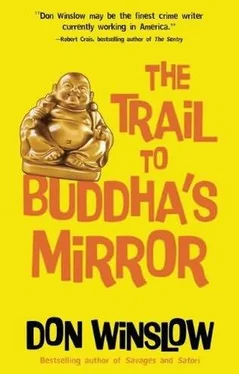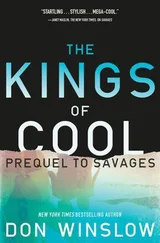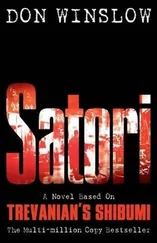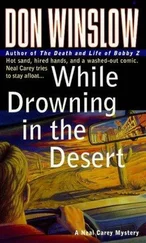Don Winslow - The Trail to Buddha_s Mirror
Здесь есть возможность читать онлайн «Don Winslow - The Trail to Buddha_s Mirror» весь текст электронной книги совершенно бесплатно (целиком полную версию без сокращений). В некоторых случаях можно слушать аудио, скачать через торрент в формате fb2 и присутствует краткое содержание. Жанр: Триллер, на английском языке. Описание произведения, (предисловие) а так же отзывы посетителей доступны на портале библиотеки ЛибКат.
- Название:The Trail to Buddha_s Mirror
- Автор:
- Жанр:
- Год:неизвестен
- ISBN:нет данных
- Рейтинг книги:3 / 5. Голосов: 1
-
Избранное:Добавить в избранное
- Отзывы:
-
Ваша оценка:
- 60
- 1
- 2
- 3
- 4
- 5
The Trail to Buddha_s Mirror: краткое содержание, описание и аннотация
Предлагаем к чтению аннотацию, описание, краткое содержание или предисловие (зависит от того, что написал сам автор книги «The Trail to Buddha_s Mirror»). Если вы не нашли необходимую информацию о книге — напишите в комментариях, мы постараемся отыскать её.
The Trail to Buddha_s Mirror — читать онлайн бесплатно полную книгу (весь текст) целиком
Ниже представлен текст книги, разбитый по страницам. Система сохранения места последней прочитанной страницы, позволяет с удобством читать онлайн бесплатно книгу «The Trail to Buddha_s Mirror», без необходимости каждый раз заново искать на чём Вы остановились. Поставьте закладку, и сможете в любой момент перейти на страницу, на которой закончили чтение.
Интервал:
Закладка:
We came to love Dwaizhou. I helped in the fields and the kitchens, and wandered all over with a stick of charcoal and rice paper, making little childish drawings. Hong played that she was a brave PLA soldier, and she acted out stories of revolutionary heroes for the peasants. And she was so proud of her nickname-because red was the color of the Party, and she was Red!
But then food became scarce. The Great Leap Forward had failed, and even Sichuan began to feel hunger.
Father tried to stop the foolish edicts. He fought the cadres when they ordered the peasants to slaughter all their livestock because livestock was property and ownership of property was Rightist. But the cadres overruled him, and the peasants had to kill their pigs and chickens and ducks, and send the food to workers in the city. But then, of course, there were no animals left to breed. I remember Father standing with the peasants as they killed their cherished breeding stock, remember him standing in puddles of blood, weeping along with the farmers. I remember the trips through the countryside, where I saw farmers standing in once fertile rice paddies and begging for food. I remember families who were once good friends fighting each other over a few fish or vegetables. I remember hunger.
My family did not starve, because Father was still an official, and had yuan to buy food. But there was often not a lot of food to buy, and many meals were made up of some cabbage and perhaps some peanuts. Sister and I missed the bowls of white rice and the steamed rolls and the “mooncakes.” But we did not complain, because so many people around us were worse off, and it was the price we all had to pay for the revolution.
But I never forgot. Hong and I would eavesdrop on Father when he would tell Mother about his latest inspection tour. He would whisper to Mother about the sights he had witnessed: dead bodies on the roadside, men chopped to pieces by villagers for stealing grain, children with open sores from malnutrition. He would sit, smoking one cigarette after another, saying that they must put a stop to it, and never let it happen again. And Mother would ask, “What is wrong with the Chairman? Has he gone mad?” Father would just shake his head.
Then suddenly it seemed that Father became very important. We learned later that he had joined with a group of reformers led by Deng Xiaoping. It was in 1960, I think, that investigations were started, and then reforms, and Father was a leader of the reforms in Sichuan and the cadres hated him. But the hunger ended, and Deng Xiaoping supported my father, and after two more years we moved back to Chengdu because Father had been made Party Secretary, a very important position.
We didn’t know then, of course, that Chairman Mao was just biding his time. We were once again very happy. We had our family and we had our dreams. I was to become a great painter and Hong was to be a great actress. We studied our arts and worked hard in school, and our evenings at home were wonderful. Mother was always curious about our work, and we always had to tell her about our day at school. I would show her my painting and Hong would perform. Father would come home late and then we would have to do it all over again, but that was wonderful, too.
And mother had been “rehabilitated.” She even began to write for the newspaper. We all went together for walks in the parks or strolls through the city streets or drives in the countryside. We often went to visit Dwaizhou, because the people there were our family now. It was a happy time and we were still children.
But our childhoods ended in 1966. Then the Great Proletarian Cultural Revolution turned all the children into Red Guards.
I was fifteen and it was springtime. Why do all the campaigns start in springtime? I was old enough then to have some small understanding of politics, so when the attacks began on Peng Zhen, the mayor of Beijing, I understood that it was really his sponsor, Deng Xiaoping, who was under attack. That was the method, you see-attack the subordinate to erode the ground beneath the superior, I was afraid, because Father worked for Deng. Then Chairman Mao himself attacked the Party professionals-such as Father-accusing them of taking the capitalist road, and we became very worried.
But also excited, because all the students at school were buzzing with Mao Thought and Making Revolution. We painted big posters supporting Chairman Mao and urging revolution. I felt badly, thinking that I was perhaps being disloyal to Father, but Hong explained that our duty to Chairman Mao and to the revolution came first, and that Father would be proud of us for our honest criticisms. She criticized our teachers for lack of revolutionary ardor and purity. She even criticized me for making “useless” paintings of hills and trees instead of “useful” paintings with revolutionary themes. I tried at first, but the pictures just would not come. Soon I did not make paintings at all.
Then the Red Guards began to appear, first in Beijing, then in Shanghai, soon after in Chengdu. Hong was one of the first to join, of course. She was so proud in her green uniform and red armband. I remember when she first walked into the house in her uniform. Mother turned pale and said nothing, and Father only observed that revolution was a complicated and sometimes painful thing. Hong was angry and said that they should support her in making revolution, in wiping out “The Four Olds”: Old Customs, Old Habits, Old Culture, Old Thinking. Father asked her if she wanted to wipe out Old China entirely, and she answered that the Red Guard was supporting Chairman Mao.
That August, Mao stood on Tiananmen Gate and reviewed a big parade of the Red Guard. That loosed the flood. Students all over China went crazy with power. Red Guard groups started everywhere, sometimes three or four groups in a single school! Mao officially announced the start of the Cultural Revolution. Students denounced teachers, professors, and party officials. They stopped going to classes. Schools shut down. All we did was make revolution.
I did as little as possible, but Hong was involved in everything. She marched with the Red Guard, she organized a theatrical troupe to act out revolutionary plays in the streets, she sometimes spent days away from home, staying at our school that the Red Guard had turned into a barracks.
Father was denounced that autumn. I was surprised and hurt that Deng joined the attack on Father to try to save himself. It didn’t work, of course, and Deng was toppled shortly after. The Red Guard went to Father’s office, tied his hands behind his back, and dragged him into the street. I was at home on the second floor of the house and heard the noise in the street. Mother went to the window first, then quickly closed the curtains. I pushed them aside and stood there watching as they put a dunce cap on Father’s head… and a rope around his chest… and paraded him down Renmin Road. I saw some of my schoolmates throw garbage at him… and spit in his face… as the Red Guard chanted “Capitalist Roader” and “Western Stooge.” Father just looked straight ahead. His face was calm and composed, and two feelings fought in my heart: hatred and pride. Hatred for the Red Guard and pride for Father. How could such opposite feelings live in the same heart?
Hong came home that afternoon. She was sobbing. I thought she was weeping for Father, but that was not the reason. She had been thrown out of the Red Guard because of Father. Her armband had been ripped off and her uniform was torn. She had bruises on her face. Mother tried to talk to her. I tried to comfort her, saying that Father had suffered a great injustice, but that it would be corrected soon, and she would have her revenge on the Red Guard. But she wasn’t angry at the Red Guard, she was angry at Father! Father had caused her downfall! We did not speak after that.
Читать дальшеИнтервал:
Закладка:
Похожие книги на «The Trail to Buddha_s Mirror»
Представляем Вашему вниманию похожие книги на «The Trail to Buddha_s Mirror» списком для выбора. Мы отобрали схожую по названию и смыслу литературу в надежде предоставить читателям больше вариантов отыскать новые, интересные, ещё непрочитанные произведения.
Обсуждение, отзывы о книге «The Trail to Buddha_s Mirror» и просто собственные мнения читателей. Оставьте ваши комментарии, напишите, что Вы думаете о произведении, его смысле или главных героях. Укажите что конкретно понравилось, а что нет, и почему Вы так считаете.












